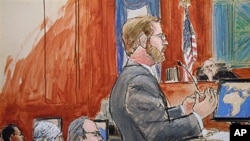A jury in New York City began deliberations Wednesday in the trial of Tanzanian Ahmed Ghailani, who is accused of conspiring to bomb the United States embassies in Tanzania and Kenya in 1998.
The jury of six women and six men left the courtroom to begin discussions of the case after listening to Judge Lewis Kaplan explain in detail the 285 separate charges against 36-year-old Ahmed Ghailani. He is the first detainee from the U.S. military detention center at Guantanamo Bay, Cuba to face charges in a U.S. civilian court.
The case has been followed closely because it represents the Obama administration's first effort to move military detainees into civilian courts. In one of his early rulings in the Ghailani case, presiding judge Kaplan said that under the U.S. Constitution, a major government witness could not testify in the trial because he was first identified by Ghailani during questioning by U.S. officials.
Ghailani was captured in Pakistan in 2004 and was transferred to Guantanamo Bay in 2006. Ghailani is accused of plotting with other alleged al-Qaida co-conspirators to bomb the U.S. embassies in Dar es Salaam and Nairobi.
Prosecutors linked him to the purchase of a truck and gas cylinders used in the Dar es Salaam bombing. Federal prosecutors told the jury that Ghailani had been present in Dar es Salaam and Mombasa with other members of the bomb plot and that his cell phone was the operational phone for the East Africa cell of al-Qaida.
Ghailani's defense attorney described his client as a dupe of the actual plotters and that Ghailani's purchase of the truck and gas cylinders were common transactions. He added that prosecution witnesses from Tanzania lacked credibility. The defense lawyer repeatedly argued that the government had not presented enough evidence to prove beyond a reasonable doubt that Ghailani had any knowledge of the plot to destroy the two U.S. embassies.
The prosecution rejected what it called the defense's "dupe theory."
In his instructions to the jury, Judge Kaplan stressed that under the U.S. Constitution, Ghailani is presumed innocent and that the burden is on the prosecution to prove that he is guilty. He said the prosecution needed to prove that Ghailani had knowingly, willingly and unlawfully joined the conspiracy. The judge added that Ghailani could be convicted for aiding and abetting the people who carried out the attacks.
Jury Begins Deliberations in Ghailani Terror Trial
- By Larry Freund




